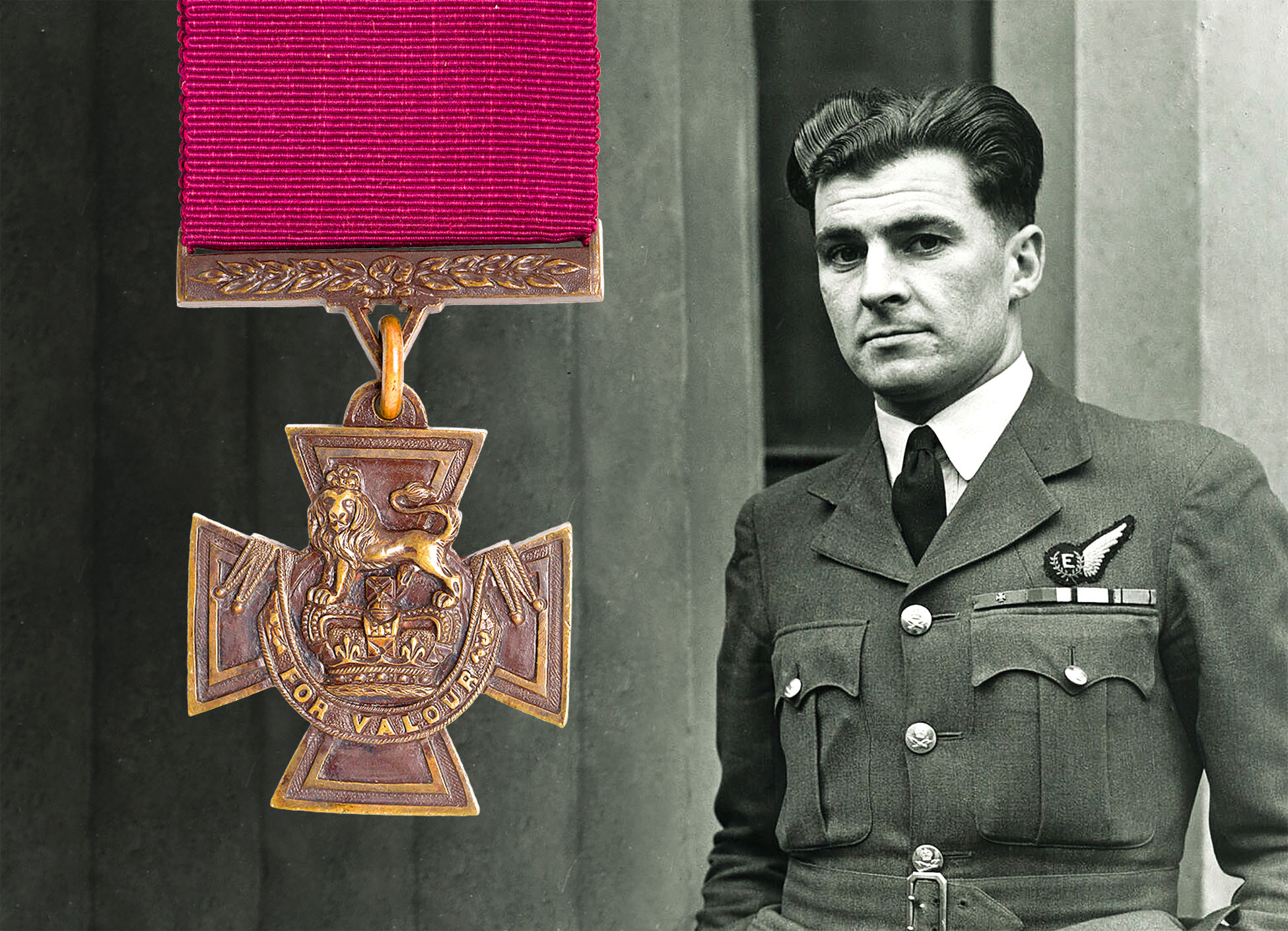Twenty-five-year-old RAF flight engineer Sgt. Norman Jackson had just completed his required 30-mission first tour in April 1944 when he agreed to fly one more mission in order to finish with his original seven-man Lancaster bomber crew. That decision led Jackson to perform, as his Victoria Cross citation put it, “an almost incredible feat.”
On the night of April 26–27 Jackson’s aircraft was one of 215 Lancaster heavy bombers and 11 Mosquito fighter-bombers targeting ball-bearing works in the Bavarian city of Schweinfurt. Jackson’s crew dropped its payload on the target. But as the bomber turned for home, a Focke-Wulf Fw 190 fighter strafed it with cannon fire, sparking a fire on the starboard wing, between the fuselage and inboard engine and adjacent to a fuel tank. The plane’s internal fire extinguisher failed to put out the flames.
Shrugging off shrapnel wounds to his right leg and shoulder, Jackson shoved a handheld extinguisher inside his jacket and resolved to fight the fire at the source. Gaining the captain’s permission, he snapped on his parachute, jettisoned the emergency hatch over the pilot’s head and climbed out onto the fuselage. As he emerged, his parachute deployed, fortunately spilling back into the plane’s cockpit. Gathering the chute, quick-thinking crewmates played out the rigging lines as Jackson inched back toward the starboard wing. The bomber was flying 200 mph at 22,000 feet in frigid air.
Just then Flying Officer Fred Mifflin banked the Lancaster to avoid another fighter attack. Thrown off balance, Jackson fell heavily from the fuselage to the starboard wing, tumbling the extinguisher from his jacket to earth. As the sergeant held on to an air intake for dear life, the flames whipped up and severely burned his face and hands. He finally lost his grip. Flung backward into the bomber’s slipstream, he dangled just behind the rear turret, twisting in the lines of his parachute, which were also smoldering.
Realizing the fire was out of control, Mifflin made the difficult decision that Jackson stood a better chance of survival if let loose, and crewmen pushed the parachute from the cockpit hatch. Mifflin then gave the order to abandon ship. Of Jackson’s six crewmates, four survived. Mifflin and the rear gunner went down with the Lancaster.
Meanwhile, Jackson—his parachute two-thirds burned—was unable to control his descent and landed heavily in a field, breaking an ankle. His right eye was sealed shut from burns, and he could not use his hands. At daybreak he crawled on his knees to a nearby village and knocked on the first door he reached. While the German who answered reviled him as a “Churchill gangster,” the man’s two daughters took pity and tended his wounds.
Jackson spent 10 months in a German hospital before being moved to a POW camp. He made two escape attempts, succeeding on the second in reaching a unit of Lt. Gen. George Patton’s U.S. Third Army near Munich. But Jackson was not one to boast. His story only came to light after surviving crewmates, released from German captivity at war’s end, shared their accounts. Jackson was duly promoted to warrant officer and awarded the Victoria Cross. “Had he succeeded in subduing the flames,” his citation read in part, “there was little or no prospect of his regaining the cockpit.”
For the rest of his life the firefighting flight engineer suffered from permanently scarred hands, periodic depression and recurrent nightmares of his time out on the wing. Regardless, Jackson found work as a whiskey salesman and raised seven children with his wife, Alma.
“I was young and cocky,” he recalled, “and thought I could do anything.” His four surviving crewmen were grateful he had tried. MH
This article appeared in the January 2021 issue of Military History magazine. For more stories, subscribe here and visit us on Facebook:





